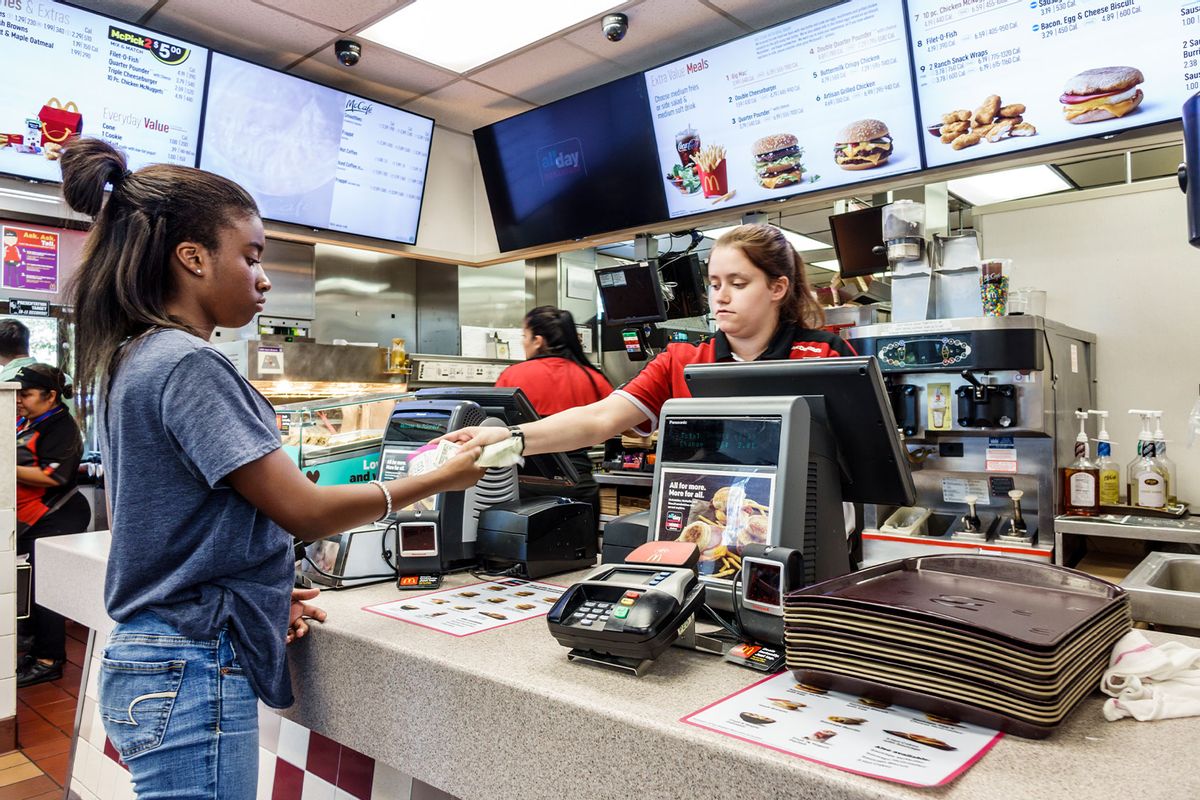McDonald's has become an unexpected issue in the 2024 campaign, as former President Donald Trump brands Vice President Kamala Harris' account of her summer job at the fast-food chain "fake" and prepares to take a fryer shift to highlight that he, too, can put his hands to work. But for Trump, putting the spotlight on McDonald's also risks drawing attention to some more damaging pieces of his record, including a concerted effort by his administration to suppress a push by McDonald's workers to raise their wages while also making it harder for them to seek accountability for legal violations.
While Trump has wrapped all three of his presidential campaigns in populist rhetoric, his administration largely sided with corporate management in its battles against workers and unions over pay, benefits and labor conditions. Much of Trump's policies, and actions to reverse those of previous administrations, went through the National Labor Relations Board (NLRB), which Trump stacked with appointees who had previously served in white-shoe law firms that consistently represented large corporations.
In a 2019 case, the GOP-controlled NLRB forced a settlement with McDonald's and its workers in a dispute over unfair labor practices, despite the objections of the workers and a previous ruling by an administrative law judge that rejected the settlement.
At the time, workers accused McDonald's of advising and coordinating with its franchisees to spy on union activity, circulate the names of pro-union workers and use illegal retaliation, including sudden firings, in its efforts to squash a union-organized campaign for a $15-an-hour wage. Bloomberg reviewed internal records that McDonald's was ordered to turn over to the NLRB, ultimately concluding that "corporate executives monitored developments as managers helped orchestrate a years-long anti-union response across the U.S."
Trump's NLRB, which was already overturning union-friendly rules and consistently siding with management in labor disputes, passed a decision that resolved allegations of wrongdoing by McDonald's and did not hold it legally liable as "joint employer" with its franchisees. Though the ruling also required McDonald's to issue back pay to its workers, the broader impact was to preserve McDonald's' business model of passing the buck to franchises that manage around 95% of its restaurants, keeping the company relatively asset-light and low-risk, while setting up barriers against workers seeking to hold it liable for violations committed by its franchisees. It's a model that has been adopted by many other large companies seeking the same advantages.
At the time, a spokesperson McDonald's Corp. said that it was "pleased" with the NLRB's decision, while officials from the Trump White House told Bloomberg that it fit within the administration's broader campaign to "unleash unprecedented economic and job growth" through deregulation.
The Fight for $15 campaign, meanwhile, accused the board of letting McDonald's walk away "with a get-out of-jail-free card after illegally retaliating against low-paid workers who were fighting to be paid enough to feed their families" in a statement posted on X.
We need your help to stay independent
The decision was further criticized by labor rights activists and legal experts over the fact that one of the board members, Trump appointee William Emanuel, did not recuse himself from the decision even though he had worked at a law firm that McDonald's hired to fight union organizers.
In 2018, the NLRB Inspector General had already dinged the board for Emanuel's involvement in an earlier decision that reversed an Obama-era rule empowering workers to pursue claims or collectively bargain against major corporations that don’t sign their paychecks. According to the report, Emanuel, whose law firm represented one of the companies involved in the original case, should have recused himself, and the failure to do so represented a “a serious and flagrant problem and/or deficiency” in the board's handling of conflict-of-interest issues.
This time, labor activists again lodged a formal petition with the board, which noted in its ruling that Emanuel's firm was not representing McDonald's or its franchisees in the specific NLRB case over McDonald's response to the Fight for $15 campaign.
Over the rest of Trump's term in office, the NLRB continued to pass rules that further consolidated McDonald's Corp. and other large corporations' power, including an early 2020 directive to shield parent companies from lawsuits by franchise employees. From the White House, Trump consistently opposed legislation that would meet the demands of union workers, such as raising the minimum wage, and slashed existing benefits for struggling Americans.
While Trump will be joining McDonald's workers behind the counter this Sunday "to see how it is," he will not be experiencing what it's like to live on McDonald's wages.



Shares